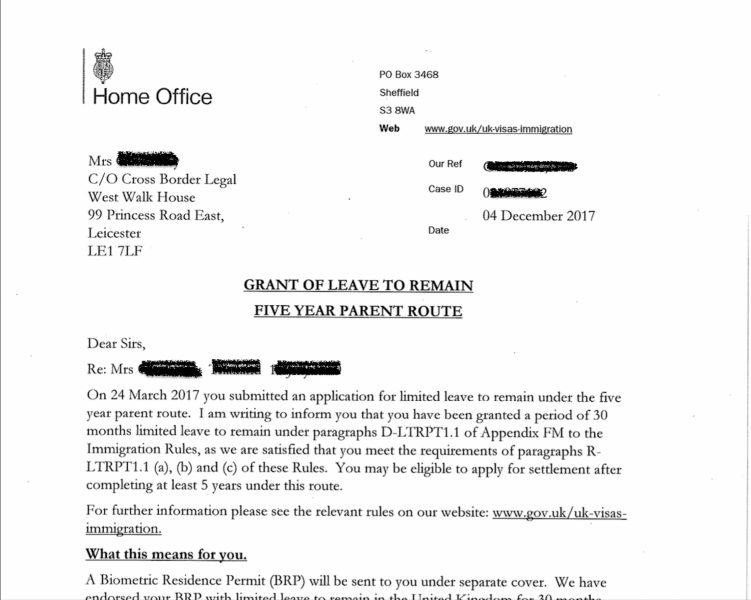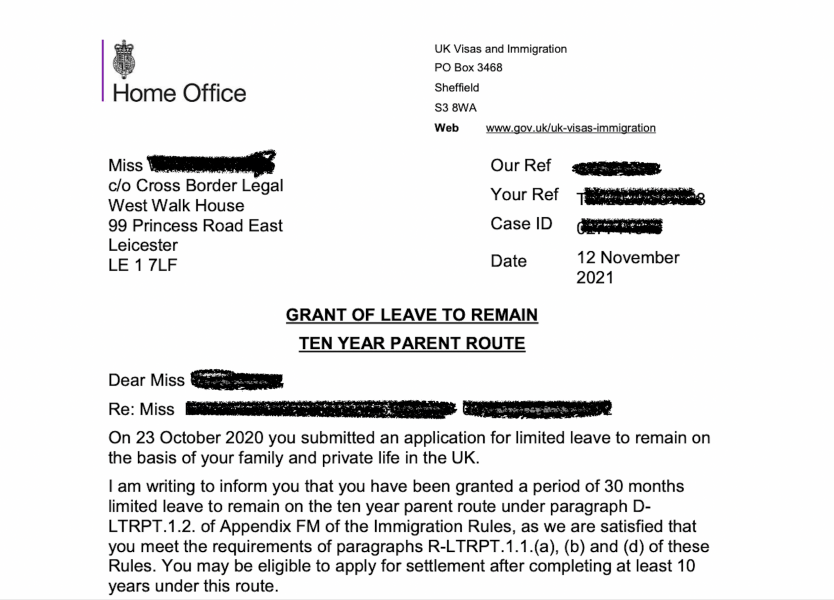One of the underlying principles in UK law is that children’s safeguards and wellbeing must be at the forefront of any government decision. This is clearly protected under section 55 of the Borders and Citizenship Immigration Act 2009 and is known by the term ‘Best Interests of the Child‘ principle.
Best Interests of the Child Principle
Under immigration law and the implementation of the Best Interests of the Child’ principle, children’s interests must be the primary consideration (although not the sole consideration) for the Home Office when considering any actions that may affect children. This approach is enshrined in law by a case called ZH (Tanzania).
This normally means that a qualifying child’s mother or father should be granted Leave where failure to do so would lead to the child either being separated from one or both parents or being forced indirectly to leave the country, abandoning their rights of residence in the UK, as this would normally be against the best interests of the child.
This position has repeatedly been enshrined in law and in recent cases (KO and others (Appellants) v Secretary of State for the Home Department (Respondent) 2018) the court has gone further to state that this principle applies regardless of the parent’s conduct, for example, if they had come to the UK illegally, as children should not be punished for their parents’ actions.
In line with this policy, there is a visa for which relevant parents can apply, to allow them to stay in the UK on the basis of their children. This article aims to expand on the various requirements and eligibilities for the Parent Route Visa.
What qualifies as a Parental Relationship?
Under immigration law, a parental relationship encompasses more than simply being the parent, biologically or otherwise, of a child, and an applicant is required to show that as well as being the parent of a qualifying child, there is an existing parental relationship. This normally means that the applicant is either a biological parent living with the child, or a biological parent not living with the child, but with sufficient contact with them, either by court order or by agreement with the other parent of the child.
It should be noted that this contact must be direct access, which normally means that it is in person and evidenced by such things as a contact order.
A word of Caution: one must be careful in disclosing any family court proceedings involving children, as these proceedings usually come with a court order for non-disclosure, requiring a written submission from the court in order to disclose them to the Home Office or any other third party.
Which children qualify?
Although generally, the Best Interests of the Child principle applies to all children, in order to qualify for a Parent visa, the child in question either needs to be a British child or one who has lived in the UK for a continuous period of 7 years.
The 7-year Parents Route (as it is traditionally known) is based on various established policies and case law, which have concluded that a child who has spent 7 years in the UK would, except for in exceptional circumstances, be best protected by allowing them to continue living in the UK. Therefore, such a child’s parents should be given lawful residence, to enable them to also continue living in the UK.
It is worth noting that a child who has lived here for 7 years would be a qualifying child regardless of whether they have been here lawfully or not. If a child has not been here lawfully, the parents should make an application for a visa for the child, as well as for themselves.
Two options: Under the law
There are two options under which this visa can be granted, which are summarised below.
Option 1: EX.1 of the Immigration rules – 5 or 10 Year Parent Route
The provisions for the Parent Route are set out in Paragraph EX.1 of the Immigration Rules, with the main requirement being the stated elements of the parental relationship with a qualifying child. However, this provision can result in either a visa being granted under the 5 years route or the 10 years route, which refers to the period of time the applicant would have to wait before being granted Indefinite Leave to Remain. To qualify under the 5 years route the applicant must also meet the requirements for adequate maintenance and accommodation and have passed the relevant English exam.
How is it decided if a 5 or 10 year Route visa will be granted?
Applicants are normally granted a visa under the 10 year parent route if they meet the essential eligibility requirements of a parental relationship with a relevant child, but fail to meet the maintenance, accommodation or English requirements, or do not currently have a visa.

For example: Jane, a single mother of two British children, who previously was in the UK with a Spouse Visa, but whose marriage has subsequently broken down, is unable to apply for a Spouse Visa extension, but could qualify for the parent 5-year route if she is able to prove that she works or has savings and therefore has suitable accommodation for herself and the children without public funds. She would be required to sit the English A1 exam and would qualify for a two and a half year visa under the 5-year route as a parent.
If Jane is not currently working and following the breakdown of the marriage has had to seek local authority help to support herself, she may not qualify for the 5 year route, but would instead be granted a visa under the 10 year parent route.
Please note that in either route the visa is granted for a 2 and a half year period initially, and the visa needs to be continually renewed until the applicant qualifies for Indefinite Leave to Remain. Both routes also have no recourse to public funds, which an applicant would need to apply for in a separate application alongside the 10-year route.
Option 2 – Outside the rules: 10-year parent route outside the rules
Although the starting point for an application under the Parent Route is EX.1 of the Immigration Rules, certain cases will fall outside the rules of this paragraph. This includes cases where the applicant is here on a Visitor Visa, as Paragraph EX.1 of the Immigration Rules would not apply.
Paragraph EX.1 also does not apply where the applicant is in a relationship with the other parent of the child, in which case they are expected to apply for a Partner Visa, if the relationship falls under the definition of Partner or Spouse.
Where Paragraph EX.1 does not apply, the provisions of GEN3.2 of appendix FM state that the Home Office has to consider if there are Exceptional Circumstances, and can grant a 10-year parent route visa where a refusal for leave would result in unjustifiably harsh consequences for the applicant or their family.

There is no precise definition of exceptional circumstances, however, the circumstances need to be more than unusual or unique and it is for the applicant (normally through the submissions of their legal representative) to prove on the balance of probability that there are exceptional circumstances, which would or could lead to unjustifiably harsh consequences.
Amongst the points of consideration for the Home Office is the extent and nature of the relationship, the likely impact on the applicant and their family of a refusal, for example a lack of security in the country that they would be relocating to, a language barrier, mental illness or learning difficulties of the child or applicant and, most importantly, the best interests of the child with regards to health and ongoing education.
Comments…
Generally, a parent of a British national or a child who has lived in the UK for more than 7 years, would have a good case for leave to be granted, given the strong emphasis of the law and previous policies on the Best Interests of the child. However, the law is more strict where the applicant has any issues of criminality, for example in a deportation case, as this application is a Human Rights application, and thus by definition must be weighed against public policy by the caseworker, who has the discretion to grant or refuse the visa.
It should be noted that although parents of British nationals or a child who has lived here for 7 years may qualify under the 5 or 10 year Parent Route, this route does not apply to persons who would otherwise qualify under the Partner Route, for example, the spouse/partner of a British national, regardless of whether that partner is the parent of a child.
Why use Cross Border Legal Solicitor to assist with an application for a visa under the Parent Route or other Immigration matter?
With more than 10 years of experience behind us and a personal understanding of the immigration process, we are experts in Immigration law and visa applications. We provide personal and effective support for your application process and handle the case from start to finish. We have assisted hundreds of happy clients – please see our testimonials – so you can be assured that with our assistance your visa application will run smoothly.
Our specialist immigration solicitor will offer you an honest general preliminary appraisal of your options for free. There is no obligation to instruct us, but if you would like our assistance, we charge a reasonable fixed fee, which you are informed of upfront and can be paid in installments to suit your circumstances.
Please feel free to share and comment to raise awareness of these issues. Also, if you have been affected by any of these immigration rule changes and need a quick chat with a UK Immigration Solicitor, do not hesitate to contact Tito Mbariti for a free one-off, no-obligation general immigration advice consultation via either phone, WeChat, WhatsApp, Facetime or Skype.
You may contact us by filling in our Quick Enquiry form any time you need professional support or have any questions. Alternatively, you can call us during office hours on 07544669131 / 0116 3800 744

